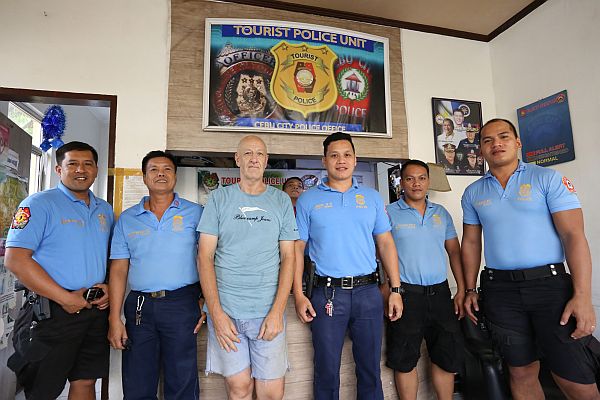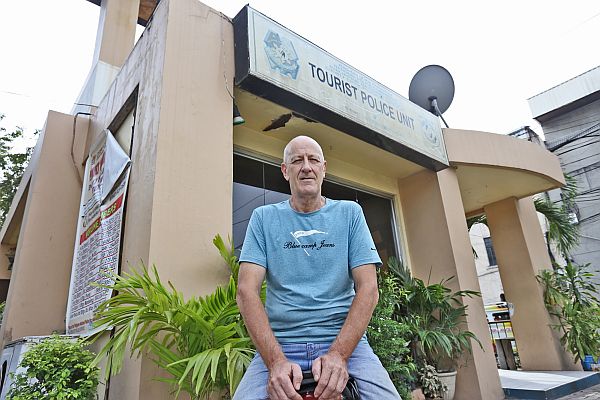
British national Philip Mark Dunn (3rd from left) poses with his new-found friends at the Cebu City Tourist Police Office located in Plaza Sugbo near City Hall. Since February 2017, Dunn has been working as the group’s “striker” or errand boy. CDN PHOTO/JUNJIE MENDOZA
British national Philip Mark Dunn used to travel a lot to Cebu and other parts of the country as a tourist, visiting Metro Manila, Leyte, Bohol and parts of Mindanao.
But far from his jet-setting days, the 60-year-old foreigner has found himself stranded in Cebu City with an expired tourist visa and moneyless.
With nowhere to go, the retired taxi driver from Flat 5 New Parade Hill View Road, England, who had lived on his pension, now lives through the kindness of policemen belonging to the Cebu City Tourist Police Office.
Dunn said he opted to stay with the tourist police because he felt safer there.
To earn his keep, he works as their errand boy or “striker.”
“A striker in English means those people who are out on the streets yelling their sentiments. Here, it is a boy, a servant,” Dunn noted with a smile.
His job includes waking up at around 5:30 a.m. to help prepare the meals of five on-duty cops by chopping vegetables and washing them. He also cleans the police office in the morning.
“Sometimes I will cook. But mostly, the officers here will do the cooking because my recipe is different from the Filipino dish,” Dunn said laughing.
But he is slowly adopting to his new environment.
Dunn shared that pancit canton is now his favorite Filipino food.
He has also learned to prepare local dishes like fried dried fish and eggplants.
Dunn said he learned his local recipes after watching a former police striker prepare meals for the cops.
Dunn’s job at the police station began 10 months ago in February 2017, when he worked as an assistant for a man known to him only as “Boy,” the station’s official striker.

British national Philip Mark Dunn brags of several Cebuano words that he has learned because of his interaction with locals. His first Cebuano word was “salamat” or thank you. Someday, when he is able to raise enough money again, he wants to return to Cebu to thank all those who had been kind to him. (CDN PHOTO/JUNJIE MENDOZA)
When Boy left, Dunn took over the job, earning between P1,500 to P2,000 a month from tips given to him by the cops.
“I am here to help these guys. They too help me in return. Sometimes I wonder why are they helping me when they barely know me? But I am thankful,” Dunn said.
Aside from free meals, Dunn also receives packs of instant coffee and cigarettes from his new-found friends.
“Sometimes I get beer, but I will just put this in a safe. When I’m on my vacant hour, mostly in the evening, I drink beer one or two at a time. But not daily,” he told Cebu Daily News.
While it is unusual for a foreign national to be seen serving Filipinos, Dunn said he does not mind.
He is happy that he has found a home at the police office and earns money to spend for his needs.
“Maybe it is an advantage also to the police in here that they have a foreigner working here you know,” Dunn said laughing.
To make himself even more useful, he would volunteer as translator for foreign nationals brought into the police office for violation of local laws.
Cebu experience
Dunn first set foot in Cebu City in 1995 supposedly for a vacation, but he ended up married to a 40-year-old Cebuana from Carmen town. They divorced in 1998.
Even after separating from his wife, Dunn said, he would continue with his Cebu visits traveling to the city at least 20 times.
He would either book a hotel room or rent an apartment unit along V. Rama Avenue.
“I like it here. I like going to new places. Generally speaking, I like the Filipino hospitality, the people,” he told CDN.
As he lived on his pension, Dunn said he would stay in the city for two to three months before flying back home.
Sometimes, he would move to another province in the country.
“It’s quite different in here and in my country. You know Western culture is so very materialistic,” he said.
In November 2007, Dunn met another Cebuana who became his girlfriend for more than two years.
While they separated in 2009, Dunn continued to visit Cebu from England until his tourist visa expired in September 2016.
Overstaying
Dunn said he wanted to reach the British Embassy for help, but he was, instead, told by an immigration officer to seek police assistance.
Dunn recalled visiting the Cebu City Tourist Police Office to ask for their help.
Four policemen accompanied Dunn back to the Bureau of Immigration (BI) office in Mandaue City where they were again told that the processing of Dunn’s expired tourist visa will have to be referred to the BI head office in Manila.
“My experience with the immigration people and the time I met my Filipina wife and girlfriend, those are the only bad experiences I could remember in Cebu. But I do not feel angry for what happened because after all I realized I take responsibility for myself,” he said.
New home
Dunn celebrated Christmas, New Year and even his 60th birthday last November 17 with his new-found family — the tourist police who contributed money to buy him a cake and a meal to share on his birthday.
“This tourist police are just spending their own money from their pocket to contribute, to give for me,” he said.
At night, Dunn would retire at the station’s storage area or inside the detention cell whenever it was empty.
“I help the police to better understand some foreigners put in jail here because some of these foreigners when they talk, police could not understand because the English is so deep. I could be the one to speak with them and say to the officers what they want,” Dunn explained.
“Some foreigners tell me thank you because I tried to make the police understand them as well as for the foreigners to try to understand the police,” he added.
According to Dunn, there had been times when locals would laugh at him being an errand boy for policemen, but he has learned to ignore the taunts.
“I am very lucky that the police help me a lot you know,” Dunn said.
Dunn plans to stay at the police office until he is able to get a new tourist visa and buy a plane ticket for his trip back home.
Dunn said that as soon as he gets to England, he will again save money for his next travel to Cebu.
“If I have enough money, I’ll come back here and pay some gratitude to these police officers,” he said.
Because of his constant contact with locals, Dunn said that he has learned several Cebuano words such as “maayong buntag (good morning), maayong hapon (good afternoon), and maayong gabii (good evening).”
His first Cebuano word, he said, was “salamat (thank you).”
Disclaimer: The comments uploaded on this site do not necessarily represent or reflect the views of management and owner of Cebudailynews. We reserve the right to exclude comments that we deem to be inconsistent with our editorial standards.
